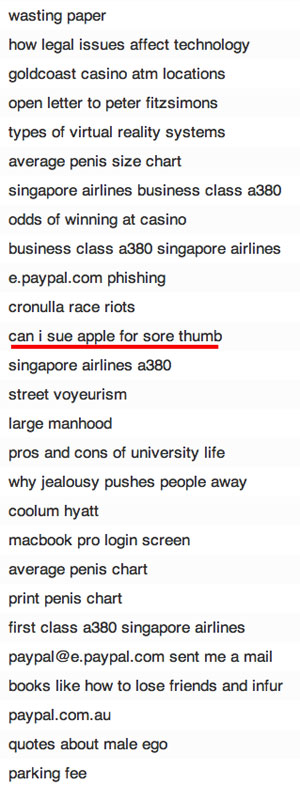
I believe that we can now read each other’s mind. When I have a spare 36 hours, I plan on starting a Thesis for my PhD looking into the ways that our deep and private thoughts can become known. How? Via Google. As you know, soon Google will become the centre of the known universe. What Google knows about you and me is startling. In Google’s short life, enough data exists to shame most people who have ever engaged with it. The great thing about Google is that it knows exactly who you are, what you do, where you live, what you are doing, when, how often, and with whom. If Google wants to (or if any Government wants to) it can place your history before any psychologist and criminologist (and a savvy legal team) and lock you up for the thoughts that you hold in your mind.
The former President of the USA, Mr George W. Bush, advocated the idea of the pre-emtive strike against nations. Send in the bombs, and obliterate a regime. Along the same lines, we might soon have to debate the merits of locking up people for their evil thoughts, so as to protect society ‘pre-emptively’. This is not new! Centuries ago people invented cyphers, so that they could speak in code? Why did people develop their own code for their own gang or tribe? So that the enemy did not infiltrate their mind. Code kept others in the dark. But now, Google shines a spotlight on everything.
 Here is an example of what I mean. This very blog site of mine receives tens of thousands of visitors. Some of them come here because they know me, or they know of me. They drop by, in order to check-out what I am thinking and what I am doing. However, many are directed to this site as a result of their Google search terms. Such people might never have heard of me. They are just trying to find out about things that interest them.
Here is an example of what I mean. This very blog site of mine receives tens of thousands of visitors. Some of them come here because they know me, or they know of me. They drop by, in order to check-out what I am thinking and what I am doing. However, many are directed to this site as a result of their Google search terms. Such people might never have heard of me. They are just trying to find out about things that interest them.
So the point here is that people traverse cyberspace based on their search terms. Such key words are revealed to me, because I am this site’s owner. Whenever I inspect the search terms that were used prior to a visitor being directed here, I chuckle or raise an eyebrow — or rub my eyes and take a second look in disbelief.
Over the years, I have realised that there are people out there whose ‘licence to surf the net’ ought to be cancelled. And there are those within the community whose search terms scare me. Indeed, they could be innocent. At worst, they could be on the cusp of committing a crime. At best, they would make fascinating dinner guests. For example, today I noticed that someone had searched for the term, ‘can I sue apple for sore thumb’. Someone has a sore thumb as a result of the unergonomic use of their iPhone? Has someone acquired tenosynovitis from texting too much? They might not contemplate that the perfect remedy would be to put the phone down and go play some ball in the sun. Instead, they think, ‘I wonder if someone has spent some time to research the options and publish an article about how I can sue Apple? I wonder if someone has come across this problem as well?’
I have seen search terms that ask how people can defraud certain banks (and they name the bank in question). I have had visitors who were searching for how to make bombs and how to crack alarm systems and how to cheat the tax department. I have seen search terms asking for directions pertaining to unspeakable acts and horrid deeds. Imagine what a good lawyer can do with that, if that person were ever arrested. Imagine what data Google has in general, and specifically.
You can see why this week the Police in Australia is seeking powers to retain telecommunications data about any and all citizens. The ultimate database of every phone number you have ever dialled, and every search term you have ever typed, along with every text message ever sent and received. Not a good idea on the whole, but actually, you can see why it makes sense. If a murderer says that he is innocent, but we later find out that he had spent hundreds of hours learning the art of ‘murder via poison’, it can shed some light onto that person’s state of mind. And then again, it might not.
I do believe that some people are a danger to society, whether now or into the future. If we can stop an evil person, we ought to try. It’s just that I do not know how accurate this would be. I say this as a person scared to reveal to you my search terms. If my Google search terms were ever made public, then anyone who did not know me and who feared me, would have all the ammunition to lock me up because I do search a lot of things that, to a stranger, out of context, would seem wild and dangerous. But, Your Honour, I am innocent, I really am… h.e.l.p!



Comments are closed.